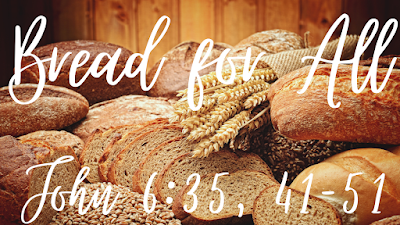Living in a Bitter Day - Amos 8:1-12 (Pentecost 6C)
Twelve years ago, I was reeling and recovering from my life implosion that happened only the previous year. I had been knocked down and to be honest, I was kind of bitter about it. I was angry that this is how my life was turning out. I knew I had to get out, make some new connections, friends, acquaintances - even. Fort Wayne was a very different place then. As much as we still had the Three Rivers Festival downtown, that was about the ONLY attraction, especially in the summer, that was going on and pulled people in from the suburbs and outlying regions to celebrate, or even to spend much time down there. If you would have gone downtown at any time after 5:00 on a weekday, you might have seen some misplaced tumbleweeds rolling down the street. Nothing was happening.
One thing that had started happening though, that there was a new young professionals group, called YLNI or Young Leaders of Northeast Indiana, who were under 40 and wanted to make Fort Wayne more palatable since they had chosen to call it home, whether they were homegrown and out on their own, or if they were transplants trying to make sense of what employer would want to send their employees to a place like this. Primarily, it was a networking group, a social club if you will. One of their first big collective projects was that they were determined to bring a farmer's market downtown. The Barr Street Market had been a cultural institution back when farm-to-table was about the way everyone ate. At its height in the 20s and 30s, the market was a hive of social gathering, open morning to night, attracting thousands of visitors. There were two large pavilions outside City Hall (now known as the History Center). The original market closed in 1966 due to pressures from the growing supermarket model of distribution and population shifts into the suburbs.
This ragtag group of business and civic leaders though, could see that there needed to be something to bring the community together. And just like all good Methodists know, food is the way to go. YLNI launched their new farmer's market the summer of 2004 with a handful of vendors for a limited start. Six years later, it grew to forty to fifty vendors in the plaza, and ten or twelve weeks long. The market's leadership was also getting older and thinking about moving on. I started volunteering for the market at the end of the summer in 2009, then by the time that the next season was starting, I found myself in a co-chair position that I was very unprepared for. I'm not sure how true this was, but at the time, I was told that if no one else was going to step forward, the market would be cancelled. And to this day, I still question whether that was a hard sell or not, because it unfortunately worked.
Thankfully enough, there was another fool who was willing to volunteer as co-chairs, so we could at least split the responsibility. Dana and I co-chaired the YLNI Barr Street Market for two years, and then I stayed on for one more, but those days were some of my best memories. I might be too nostalgic for it, but when I was in the low place that I was, the smells and sounds of the market lifted me out of it. Starting with the colorful arrangements of berries and flowers, it's like the city became this explosion of color and life that appeared out of nowhere. Then next there was corn and leafy vegetables, followed at the end of the season by gourds and pumpkins. There was something special about this time of year, to be participating in the seasons as they were happening, instead of just being an observer.
Even as I’m talking about it, I can imagine it in my brain. The sounds and the smells. Helen Keller once wrote, “Smell is a potent wizard that transports you across thousands of miles and all the years you have lived. The odors of fruits waft me to my southern home, to my childhood frolics in the peach orchard. Other odors, instantaneous and fleeting, cause my heart to dilate joyously or contract with remembered grief. Even as I think of smells, my nose is full of scents that start awake sweet memories of summers gone and ripening fields far away.”
Summer fruit is a blessing, both to the grower and the consumer. As we turn now to our scripture, Amos here is not very blessed with the summer fruit he has been presented with. We find in our text today that Amos is having another vision, his last. Much like last week, God again asks him, "Amos, What do you see?” Amos then plainly tells God what he sees, because he may be overwhelmed with being in the presence of the creator, he can only tell God what is actually true. But what does God do? He switches up the metaphor for that ripe fruit to ripe justice.
Verse 3 says, “In that day, the songs in the temple will turn to wailing. And many bodies, flung everywhere. Silence!” Why would wailing turn into silence? Well - after witnessing something so horrific, all that’s left to give is silent contemplation. Could this be any more graphic?
These images change so rapidly, what is God’s deal? God is impatient because they are not listening to Amos, and he feels he needs to step in with his goal of justice for his people. This is nearly a millennium before Jesus, but he has a similar message when in Mark 10, Jesus says, “It is easier for a camel to go through the eye of a needle than for someone who is rich to enter the kingdom of heaven.” This may not sit well with modern readers, because at least globally speaking, we are all rich, so are we all about to be condemned?
God continues in verse four and five, saying “Hear this, you that trample on the needy, and bring to ruin the poor of the land, saying, ‘When will the new moon be over so we may sell grain; and the sabbath so that we may offer wheat for sale?” What God is saying is that these wicked people God is going against just can’t wait for the holy time to get over so they can go back to making money, missing the whole point of what God wants. They are not being transformed by God’s awesome power and generosity. They’re just going through the motions of belief so that they put up appearances of being righteous.
It used to be part of the culture, built into the system, if you will. A collective day of rest for everyone.
How many businesses now use the Sabbath as a marketing ploy, claiming that since they’re closed on Sunday, they’re somehow better than everyone else remaining open? Not only that, but when the owners are promoting causes more injustice, how does that look? I know it’s not many but when non-believers see these schemes, they are turned off because of the hypocrisy, hurting the witness of believers everywhere.
So the next line talks about the ephah small and the shekel great in verse five, God is talking that the customers would be receiving less than what they paid for. Rich merchants may use weighted scales, or throw in the floor sweepings with their grain. How do you think this looks in the eyes of God? Not only were weights and measurements not standardized at this time, but also limited education and literacy plagued many, and they were taken advantage of, that even the marketplace was a place of injustice. An idea that even in our modern context can be deceptive - the idea that the free hands of the market guide prices and supplies, but how does insulin go from being affordable to outrageously overpriced in the matter of weeks or months - when it’s the exact same product?
We are in a time of great inflation. Gas prices have been fluctuating wildly and it seems that everything else is getting so much more expensive, but our wages and pensions stay the same, losing ground with how much we need to survive, let alone break out of the cycle of living paycheck to paycheck. I’m not here to say that my salary needs to be increased at all, don’t let that be your takeaway, but didn’t we learn in algebra classes that to make the equations balanced, we need to do the same thing to both sides? Like when 2x+10 = 40, first we need to subtract ten from both sides, then divide by two? I know economics, especially macroeconomics, is much more nuanced than that, but it’s hard to see that when companies are reporting record profits quarter after quarter.
This has been a heavy message today, I feel it. I immediately want to turn the corner and say, “Hey… that’s not the end of the story…” to bring it back to positivity because of my own comfort. The picture even on the cover brought up debate in the office a little bit. I picked it because of the great different between the beautiful freshly picked apple and the over-ripe ones in the basket. Julie mentioned to me that a bunch of you have canned fruits and vegetables for storage, and that the riper the fruit, the sweeter it is. In her mind, having the super sweet fruit and the title of “Living in a Bitter Day” could not be reconciled. But here’s what I’ll say about it. The fresh summer fruit, like the green apple in the picture is meant to be eaten. It’s not supposed to stay in the basket. If all you’re doing is looking at it, the apple will spoil - literally before your eyes. It’s meant to be consumed, enjoyed, and shared. Just like the fruits of the Spirit in each of us - when those fruits rot in and among us, God’s heart breaks. When we come to God in alleviating our discomfort, it’s almost like we’re mocking the full and abundant love that God has for his creation.
I will agree that the punishment was harsh. God was to render judgment on his people, whom he had told to be faithful and blessed. He wanted to hold them accountable for their failures. But what they got and what we get - every morning - is compassion and mercy. Our Sovereign God loves us more than he wants us to be punished. I started this sermon talking about the farmers’ market and how my involvement changed my life. Seasons change too, and the righteous anger God has can change, but thankfully God’s mercies have not ended, and they also have changed my life and they can change yours.
.png)



Comments
Post a Comment